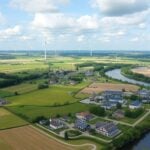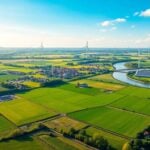Deadline: 19 September 2024
The Climate Change Programme under the Department of Science & Technology (DST) is inviting applications to tackling the complex issues posed by climate change through a variety of initiatives.
The initiatives include Climate Change Science and Adaptation, Climate Modeling, Coastal Vulnerabilities, Himalayan Ecosystem, Glaciology, Human Capacity Building, Institutional Capacity Building, Vulnerabilities and Risks Assessment, Research & Development in thematic areas of Climate Change, Innovation and Technique Development, Sector-Specific Adaptation like Water, Agriculture, Health, Biodiversity and Ecosystems etc. As part of these efforts, DST is seeking proposals focused on Urban Climate Research and Extreme Events, acknowledging the specific and urgent climate challenges faced by India’s urban areas.
With India’s rapid urbanization, cities are increasingly susceptible to climate impacts such as extreme heat, urban heat islands, flooding, infrastructure damage, air pollution, public health threats, biodiversity loss etc. Addressing these issues is crucial for ensuring the health, safety, and economic stability of millions of urban residents. This call for proposals is a key component of DST’s broader Climate Change Programme (CCP), under the Climate, Energy and Sustainable Technology (CEST) Division and one of the deliverables of the National Mission on Strategic Knowledge on Climate Change (NMSKCC). The Urban Climate Research and Extreme Event Call aims to promote research, innovation, and strategic knowledge development, for building strong human and institutional capacities to enable Indian cities to enhance their resilience, ensure sustainable development and improve the quality of life.
Objectives
- The present call for proposal does not aim to fund conventional, routine and regular proposal on Urban Climate Research and Extreme Event, but will focus on any one of the following objectives through interdisciplinary multi-institutional efforts involving stakeholders on:
- Advanced Simulations and Understanding of Urban Microclimate in a Changing Environment
- Observational network within a city and development of strategies for designing such network considering meteorological variability within the city.
- Urban microclimate simulations at hyperlocal scale or advanced machine learning approaches with an objective to capture extremes and their spatial variability within city.
- Urban Early Warning
- Hyperlocal urban early warning system for air pollution, temperature extremes, rainfall extremes, fog and flooding.
- Designing and co-developing sector specific decision tools based on early warning.
- Adaptation Gap and Design
- Hyperlocal vulnerability map for the city/ urban region.
- Observational network within a city and development of strategies for designing such network considering meteorological variability within the city.
- Advanced Simulations and Understanding of Urban Microclimate in a Changing Environment
Scopes
- Future Scope for undertaking Research on Climate Change Impact in Urban Areas:
- Urban Heat Island (UHI) Effect: An urban heat island (UHI) is an urban area or metropolitan those are warmer than surrounding suburban and rural areas due to the absorption of heat by concrete and other building materials and the removal of vegetation and loss of permeable surfaces, both of which provide evaporative cooling area.
- Urban Flooding: Urban Flooding refers to the submergence of usually dry area by a large amount of water that comes from sudden excessive rainfall, an overflowing river or lake, melting snow or an exceptionally high tide.
- Social Vulnerabilities to Extremes: Socio-economic factors affect the preparation, adaptation, vulnerability and resilience of different urban communities to the floods.
- Urban Health Problems/Diseases: Climate change significantly impacts environment-related diseases by altering ecosystems and exacerbating conditions that promote disease transmission.
Schemes
- Research & Development-Climate Change Programme
- Major Research & Development Programme (MRDP) on Urban Climate Research & Extreme Event
- R&D Programme on Urban Climate Research & Extreme Event
Funding Information
- Major Research & Development Programme (MRDP) on Urban Climate Research & Extreme Event:
- Budget Ceiling: ₹ 3 Crore
- Duration: 3 Year
- R&D Programme on Urban Climate Research & Extreme Event:
- Budget Ceiling: ₹ 1 Crore
- Duration: 3 Year
Eligibility Criteria
- Major Research & Development Programme (MRDP) on Urban Climate Research & Extreme Event:
- Educational Background: The PI should hold a Ph.D. or equivalent degree in a relevant field such as Climate Science, Urban Planning, Environmental Science, Earth Science, Atmospheric Science, Meteorology or a related discipline.
- Experience: A minimum of 5 years of relevant post-doctoral experience in research, teaching, or professional practice related to urban climate, climate change adaptation, or urban sustainability and atmospheric science.
- Collaboration with Government Ministries: The Principal Investigator (PI) must possess a minimum of three years of experience in projects that involve collaboration with the Department of Science & Technology/ Ministry of Earth Sciences/ Ministry of Environment, Forest and Climate Change (MoEFCC) or any Government Department. This experience should demonstrate leadership or significant contributions to projects that align with the thematic area of Urban Climate Research and Extreme Events.
- R&D Programme on Urban Climate Research & Extreme Event:
- Educational Background: The PI should hold a Ph.D. or equivalent degree in a relevant field such as Climate Science, Urban Planning, Environmental Science, Meteorology or a related discipline.
- Experience: A minimum of 5 years of relevant post-doctoral experience in research, teaching, or professional practice related to urban climate, climate change adaptation, or urban sustainability and atmospheric science.
For more information, visit Department of Science & Technology.


























